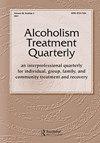经颅直流电刺激(tDCS)治疗对酒精依赖解毒住院患者神经心理功能的影响:一项随机假对照临床试验
IF 0.9
Q4 SUBSTANCE ABUSE
引用次数: 0
摘要
摘要酒精依赖者在解毒后经常出现认知功能障碍,即使在持续戒酒后也会持续存在。经颅直流电刺激(tDCS)已显示出改善这些患者认知功能的希望。本研究的主要目的是评估10次针对背外侧前额叶皮质(DLPFC)的经颅直流电刺激(tDCS)对住院戒酒的酒精依赖患者神经心理功能的影响。这项单中心、平行、单盲随机对照试验评估了10次附加tDCS治疗对神经心理功能的影响。44名最近解毒的酒精依赖住院患者被随机分配到常规治疗(TAU)加10次左侧DLPFC上的活动tDCS,或TAU加10次假tDCS,并评估tDCS疗程和时间对神经心理功能的影响。在T1(戒酒9.95 + 2.42天)和T2(戒酒19±1.48天)接受酒精依赖治疗的住院患者进行神经心理功能评估,虽然时间对各种神经心理测试的平均得分有显著影响,但重复测量的双向方差分析显示,积极的tDCS治疗及其与时间的相互作用对神经心理功能都没有显著影响。在酒精依赖的解毒住院患者中,与假治疗相比,tDCS治疗对神经心理功能没有显著影响,而戒酒大约三周导致各种认知领域的显着改善,包括心理速度,语言学习和记忆,视觉记忆,语言流畅性和反应抑制。关键词:经颅直流电刺激(tDCS)背外侧前额叶皮层(DLPFC)语言学习和记忆反应抑制语言流畅性酒精依赖致谢如果没有我们的患者及其家属的努力和意愿参与研究方案,这项工作是不可能的。在此,我们谨向患者及其家属以及NDDTC的医务人员表示感谢,AIIMS一直致力于提供患者护理相关服务,并证明了他们的帮助之手。披露声明作者未报告潜在的利益冲突。所有作者都对最终稿进行了评论和贡献。所有作者都同意提交最终版本。本研究得到了印度政府科技部认知科学研究计划(CSRI,科学技术部(DST/CSRI/2017/149))的资助,并利用了印度新德里全印度医学科学研究所国家药物依赖治疗中心的相关资源和设施。本文章由计算机程序翻译,如有差异,请以英文原文为准。
Effects of Transcranial Direct-Current Stimulation (tDCS) Treatment Sessions on Neuropsychological Functioning Among Detoxified Inpatients with Alcohol Dependence: A Randomized Sham-Controlled Clinical Trial
ABSTRACTIndividuals with alcohol dependence often experience cognitive dysfunction after detoxification, which can persist even after sustained abstinence. Transcranial direct current stimulation (tDCS) has shown promise in improving cognitive functioning in these patients. The main objective of this research was to assess the impact of ten sessions of transcranial direct-current stimulation (tDCS) targeting the dorsolateral prefrontal cortex (DLPFC) on the neuropsychological functioning of hospitalized individuals with alcohol dependence who have undergone detoxification. This single-center, parallel, and single-blind randomized controlled trial assessed the effects of ten sessions of add-on tDCS treatment on neuropsychological functions. 44 recently detoxified alcohol-dependent inpatients were randomly assigned to either treatment as usual (TAU) plus ten sessions of active tDCS over left DLPFC, or TAU plus ten sessions of sham tDCS and assessed the effect of tDCS sessions and time on neuropsychological functions. Neuropsychological functions were evaluated in inpatients undergoing treatment for alcohol dependence at T1 (9.95 + 2.42 days abstinence) and T2 (19 ± 1.48 days abstinence), and while time had a significant impact on mean scores of various neuropsychological tests, neither active tDCS treatment nor its interaction with time displayed a significant effect on neuropsychological functioning, as revealed by two-way ANOVAs with repeated measurements. In detoxified inpatients with alcohol dependence, tDCS treatment was not found to have a significant impact on neuropsychological functioning when compared to sham treatment, whereas abstinence from alcohol for approximately three weeks resulted in significant improvements in various cognitive domains including mental speed, verbal learning & memory, visual memory, verbal fluency, and response inhibition.KEYWORDS: Transcranial direct-current stimulation (tDCS)dorsolateral prefrontal cortex (DLPFC)verbal learning & memoryresponse inhibitionverbal fluencyalcohol dependence AcknowledgmentsWithout the efforts and willingness of our patients & their families to participate in the study protocol, this work would not have been a possibility. Thereby, we wish to extend our gratitude to the patients & their family members along with the medical staff at NDDTC, AIIMS indulged in delivering patient-care-related services and proved to be a helping hand.Disclosure statementNo potential conflict of interest was reported by the author(s).CRediT authorship contribution statementAll authors commented on and contributed to the final draft. All authors approved the final version for submission.Additional informationFundingThis study was supported by grants from the Cognitive Science Research Initiative (CSRI, Department of Sciences and Technology (DST/CSRI/2017/149), Ministry of Science and Technology, Government of India, and by the use of relevant resources and facilities available at the National Drug Dependence Treatment Centre, All India Institute of Medical Sciences, New Delhi, India.
求助全文
通过发布文献求助,成功后即可免费获取论文全文。
去求助
来源期刊

Alcoholism Treatment Quarterly
SUBSTANCE ABUSE-
CiteScore
1.60
自引率
11.10%
发文量
31
期刊介绍:
Alcoholism Treatment Quarterly is an exciting professional journal for clinicians working with persons who are alcoholic and their families. Designed to bridge the gap between research journals and information for the general public, it addresses the specific concerns of professional alcoholism counselors, social workers, psychologists, physicians, clergy, nurses, employee assistance professionals, and others who provide direct services to persons who are alcoholic. The journal features articles specifically related to the treatment of alcoholism, highlighting new and innovative approaches to care, describing clinical problems and solutions, and detailing practical, unique approaches to intervention and therapy.
 求助内容:
求助内容: 应助结果提醒方式:
应助结果提醒方式:


